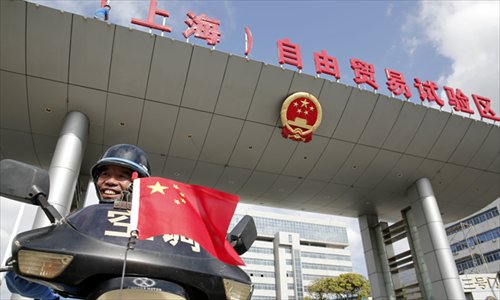Pilot FTZ ready to launch

A motorbike rider passes the No. 3 gate of the China (Shanghai) Pilot Free Trade Zone (FTZ) in Shanghai on Friday. Photo: Cai Xianmin/GT
Read more: Shanghai pilot FTZ to be inaugurated on September 29
The highly anticipated China (Shanghai) Pilot Free Trade Zone (FTZ) will be officially launched Sunday. The first on the Chinese mainland, the FTZ is seen as an important step in China's economic reform and the internationalization of the yuan.
The State Council, China's cabinet, Friday issued detailed plans for the FTZ, which aims to deepen financial innovation and build a business environment that is on a par with international standards.
The 28.78-square-kilometer FTZ will cover the Waigaoqiao Free Trade Zone, Waigaoqiao Bonded Logistics Zone, Yangshan Free Trade Port Area and Pudong Airport Comprehensive Free Trade Zone in Shanghai.
As the most-watched area in the FTZ, there will be breakthroughs in financial reform: renminbi capital accounts will be freely convertible and interest rates will be made more market-oriented to facilitate the FTZ as an offshore yuan center.
The State Council's plans on Friday stated, "Under the premise that risks are controllable, there can be a trial within the zone on the convertibility of renminbi capital accounts, the marketization of interest rates in the financial market and the cross-border use of the yuan."
The plans also mentioned that as part of financial innovation, the FTZ will be "fully open" to private business and foreign financial institutions that are in line with official requirements to set up foreign capital banks and joint-venture banks in the zone. Foreign enterprises will also be gradually allowed to take part in commodity futures exchange.
Some have said that the finalized FTZ plans are more conservative than when they were proposed. For example, on financial innovation, the plans added that financial reforms can be implemented under "controllable risks."
Sun Lijian, a deputy head of the School of Economics at Fudan University, said the central government is prudent with the opening-up of the financial industry in the zone.
"There will be offshore yuan business in the zone but it is only limited to yuan trade settlements, which could greatly contribute to trading but little to investment and financing businesses of financial institutions there," Sun told the Global Times.
However, Chen Bo, a professor and deputy director of the Research Center on the Shanghai Free Trade Zone at the Shanghai University of Finance and Economics, noted that the finalized plans are actually not that different from the proposals. "Perhaps people had too many expectations of the FTZ," he said.
In the area of investment, the FTZ will introduce "negative list" management, which means that apart from items stated on the list, any other business can operate within the zone. This is to help reduce administrative interference and build an international business investment management system, said analysts.
"The 'negative list' management mode is more efficient and transparent, letting enterprises in the zone know exactly what should not be done instead of waiting for a reply from authorities whether their practices are in accordance with the list," Chen told the Global Times.
Those hoping for access to websites banned on the mainland such as Facebook and YouTube, as the South China Morning Post has recently reported, will be disappointed as the Xinhua News Agency reported Friday that there will be no exception to Internet control within the FTZ, citing an official from the FTZ management committee.
Sun said the government has to first loosen controls over low-risk sectors such as the service industry, and if it works out well in the zone, other sectors that are related to social stability, such as the Internet, may eventually be opened up.
Chen said consumers in Shanghai will be able to benefit from cheaper products as commodities sold in the zone may be priced lower due to the reduction in customs procedures.
Administrative approvals concerning Chinese laws on foreign enterprises and joint-venture business within the FTZ will be suspended from October 1 for three years, according to the plans.
Zhang Ye contributed to this story